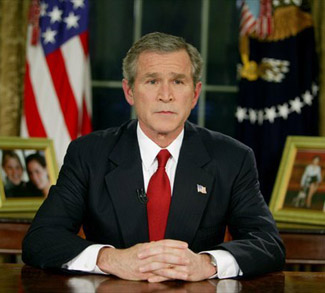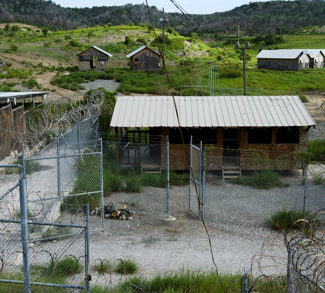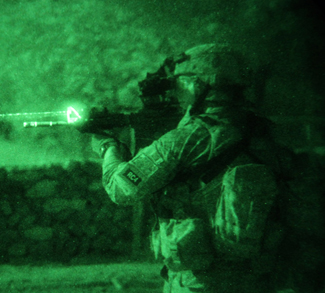“Nobody’s above the law,” President Barack Obama declared in 2009, as Congress contemplated an investigation of torture authorized by the Bush administration.
But Mr. Obama has failed to honor those words. His Justice Department proclaimed its intention to grant a free pass to Bush officials and their lawyers who constructed a regime of torture and abuse. Attorney General Eric H. Holder Jr. announced last week that his office will investigate only two instances of detainee mistreatment. He said the department “has determined that an expanded criminal investigation of the remaining matters is not warranted.” Holder has granted impunity to those who authorized, provided legal cover, and carried out the “remaining matters.”
Both of the incidents that Holder has agreed to investigate involved egregious treatment and both resulted in death. In one case, Gul Rahman froze to death in 2002 after being stripped and shackled to a cold cement floor in a secret American prison in Afghanistan known as the Salt Pit. The other man, Manadel al-Jamadi, died in 2003 at Abu Ghraib prison in Iraq. He was suspended from the ceiling by his wrists, which were bound behind his back. Tony Diaz, an MP who witnessed al-Jamadi’s torture, reported that blood gushed from his mouth like “a faucet had turned on” when al-Jamadi was lowered to the ground. These two deaths should be investigated and those responsible punished in accordance with the law.
But the investigation must have a much broader scope. More than 100 detainees have died in U.S. custody, many from torture. And untold numbers were subjected to torture and cruel treatment in violation of U.S. and international law. Gen. Barry McCaffrey said, “We tortured people unmercifully. We probably murdered dozens of them during the course of that, both the armed forces and the C.I.A.”
Detainees were put in stress positions, including being chained to the floor, slammed against walls, placed into small boxes with insects, subjected to extremely cold and hot temperatures as well as diet manipulation, blaring music, and threats against themselves and their families.
At least three men were waterboarded, a technique that makes the subject feel as though he is drowning. Pursuant to the Bush administration’s efforts to create a link between Saddam Hussein and Al-Qaeda, Khalid Sheikh Mohammed was waterboarded 183 times. Abu Zubaydah received this treatment on 83 occasions.
American law has long recognized that waterboarding constitutes torture. The United States prosecuted Japanese military leaders for torture based on waterboarding after World War II. The Geneva Conventions and the U.S. War Crimes Act make torture punishable as a war crime.
Lawyers in the Bush Justice Department’s Office of Legal Counsel, including John Yoo and Jay Bybee, wrote the torture memos. They redefined torture much more narrowly than the Convention against Torture and the War Crimes Act, knowing interrogators would follow their advice. They also created elaborate justifications for torture and abuse, notwithstanding the absolute prohibition of torture in our law. When the United States ratified the Convention against Torture, it became part of U.S. law under the Constitution’s Supremacy Clause. The convention says, “No exceptional circumstances whatsoever, whether a state of war or a threat of war, internal political instability or any other public emergency, may be invoked as a justification of torture.”
George W. Bush, Dick Cheney and Yoo have all said they participated in the decision to waterboard and would do it again. Thus, they have admitted the commission of war crimes.
Maj. Gen. Anthony Taguba, who directed the investigation of mistreatment at Abu Ghraib, wrote, “there is no longer any doubt as to whether the [Bush] administration has committed war crimes. The only question that remains to be answered is whether those who ordered the use of torture will be held to account.”
Taguba’s question has been answered. None of those lawyers or officials will be brought to justice. Outgoing C.I.A. Director Leon Panetta said, “We are now finally about to close this chapter of our agency’s history.” Ominously, David Petraeus, incoming C.I.A. Director, told Congress there might be circumstances in which a return to “enhanced interrogation” is warranted. That means torture may well continue during Obama’s tenure. This is unacceptable.
Not only is torture illegal; it doesn’t work and it makes people outside the U.S. resent us even more. High-level interrogators such as F.B.I. agent Ali Soufan have said the most valuable intelligence was obtained using traditional, humane interrogation methods. Former F.B.I. agent Dan Coleman agrees. “Brutalization doesn’t work,” he observed. “Besides that, you lose your soul.”




